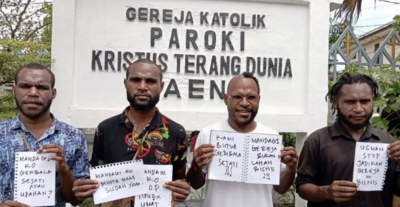 Papuans hold protest in front of the Christ the Light of the World Parish Waena in Jayapura seeking an apology from Archbishop Petrus Canisius Mandagi and clarification on his support for a food estate project that could threaten indigenous forests. (Photo supplied)UCA News | 17 February 2025
Papuans hold protest in front of the Christ the Light of the World Parish Waena in Jayapura seeking an apology from Archbishop Petrus Canisius Mandagi and clarification on his support for a food estate project that could threaten indigenous forests. (Photo supplied)UCA News | 17 February 2025Indonesian prelate warns of legal action against critics
An Indonesian archbishop has appointed a lawyer, threatening legal action against those criticizing his support for a food estate project in South Papua province, that indigenous people oppose fearing destruction of their forests.
Archbishop Petrus Canisius Mandagi of Merauke told UCA News on Feb. 17 that he has appointed Pieter Ell as his lawyer, who would report his Catholic critics to the police if they do not stop.
“I am also an Indonesian citizen,” said the prelate, claiming he has the same legal rights as other citizens to file a complaint with the police.
Mandagi has been the target of public criticism, especially by Catholics in his own diocese, for supporting the government's plan to set up a food estate project on 2 million hectares of rice fields in southern Papua.
Details of Mandagi's alleged meetings with private investors and military officers in September last year circulated on social media.
The prelate then openly expressed his support for the project, which he claimed was for the welfare of the Papuan people.
In a statement last week, Ell acknowledged his appointment. He wanted all those who "attack the archbishop, both verbally and in writing on social media, to stop immediately."
He also threatened to take “both legal and non-legal steps” against those in the diocese, who insulted the archbishop.
The prelate’s stance has led a group of Catholic laymen to hold regular protests every Sunday in the yard of some parish churches in Papua.
They displayed posters asking Mandagi to apologize and clarify his support for the project and streamed the protests live on Facebook.
The protesters include indigenous peoples, Catholics, and priests in Papua.
The Awyu tribe in the Merauke Archdiocese have chosen to plant red crosses (salib merah) on their land, a symbol of an effort to defend the land from being taken over by private investors.
In an appeal on Nov. 11 last year, the Papuan Council of Churches and a coalition of indigenous Catholic priests criticized Mandagi and accused him of being indifferent to the concerns of indigenous people.
Soleman Itlay, a layman who helped organize the Sunday protests, said he was not afraid.
"If the legal path is taken, then it will become even more interesting,” he said.
Mandagi said he supported the project because God created the resources for the human to utilize.
"Please feel free to question my stance, but for me, the land was created by God for human life," he said.
Archbishop Mandagi also drew criticism in 2021 when he signed an MoU with an environmentally controversial palm oil company, PT Tunas Sawa Erma, a subsidiary of the Korindo Group, and a joint Indonesian and South Korean venture.
The company reportedly paid 800 million rupiah (US$49,336), part of a 2.4 billion rupiah commitment to be fulfilled in stages over three years.
He was criticized by Catholics and environmental activists because the company was considered to be destroying natural forests in Papua.












